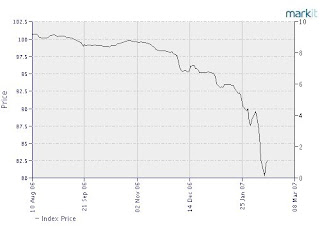Of course, its always tempting, as the link above discusses. For example, take a look at the ABX-06 BBB- 2 index, which is an index of BBB minus rated home equity deals. Most of these are sub-prime.
 Now for anyone not familiarity with typical price movements the investment-grade bond market, the move by this ABX index is extreme. On a 5-year issue, a 20-point move implies some 400bps of widening. In this interest rate environment, the only coupon paying bonds with dollar prices in the low 80's are companies where serious trouble is imminent. We aren't talking merely about junk-rated issues. We're talking about bonds where near-term default is a distinct possibility.
Now for anyone not familiarity with typical price movements the investment-grade bond market, the move by this ABX index is extreme. On a 5-year issue, a 20-point move implies some 400bps of widening. In this interest rate environment, the only coupon paying bonds with dollar prices in the low 80's are companies where serious trouble is imminent. We aren't talking merely about junk-rated issues. We're talking about bonds where near-term default is a distinct possibility.
These ABX indices are a bit complicated and I don't want to get into the nitty gritty of them here. But consider the following: unlike normal CDS, which trade on a spread basis, these trade with a dollar price. So if you see a dollar price of $81.61, that means that in order to buy protection on this pool of home equity deals, not only must you pay the fixed spread over time, (242 bps on this deal) but you must make an up-front payment of 18.39% of the notional value you are buying!
The historical recovery rate on sub-prime home equity is around 70%. So by paying nearly 20% up front for protection, you are putting an extremely high probability on the entire index going default. In other words, not just historically high delinquencies, but truly catastrophic waves of bankruptcies. Around 4% of the loans in this index are currently 60 days delinquent.
No other security in the market is trading like mass defaults are likely. If such wide-spread defaults were going to happen, where would the CDS for names like WaMu, Countrywide or CapOne be trading? According to recent quotes I've seen, the widest of that group is CFC at a whopping 35bps.
Are delinquencies going to be high in 2007? Yes. Are they going to be high in 2008 and 2009 too? Probably. Will more sub-prime lenders go bust? Yes, because they foolishly assumed the good times would last forever. Will there be enough defaults in home-equity pools to justify trading in the ABX index? I doubt it.
Will the technicals that have driven this index to such low levels continue to drive it even lower? In other words, how good are you at catching falling knives?
How many defaults does it take to make a BBB minus rated home equity index worhtless? I assume one default cancels out multiple good loans. So yes, this could be a total train wreck.
ReplyDeleteBy the way, you can get rid of that word verification if you want to. Google thinks investment websites are spam, so puts this on. You can contact them to get it removed.
I write about precious metals among a host of other topics on my blog, visit if you like.
Could the reason for the high price of protection be the result of inflated home appraisal values when these home equity loans were taken out?
ReplyDeleteFor example: You have a home you bought five years ago for 200k (160k mortgage, lets say IO 5yrs, for simplicity). This year it appraised for 500k. You took out a 30yr home equity loan for 240k (80% total LTV). Say two years from now, the home is only worth 250k. Your outstanding mortgage is ~156k, and your home equity loan outstanding is ~234k. Your recovery rate on the home equity piece (which I assume is subordinate to the first mortgage) is only about 40%.
In other words, the 70% recovery rate estimate might not hold if there's across-the-board price depreciation in home values from the peak of the housing market appraisal values used to originate those HELs.
The high cost of protection could be a gamble that recovery rates are far too optimistic rather than a bet on outright catastrophic numbers of defaults.
Then again, I could be talking out of my ass. Is that kind of home price depreciation needed to make 70% inaccurate highly unlikely?
By the way, could you explain how you calculate the cost of protection on something like this? I'm curious how you get the 18% number and would like to learn.
Laurence:
ReplyDeleteI assume no relation to the more famous metals investors of the same name? Thanks for the tip I'll check it out.
Apolitical:
I think the recovery rate is tough to pin down, but it seems a safe bet that it will be below average for the next 2-3 years. I was a bit cavalier in throwing out 70%.
Anyway, see today's post for more discussion.